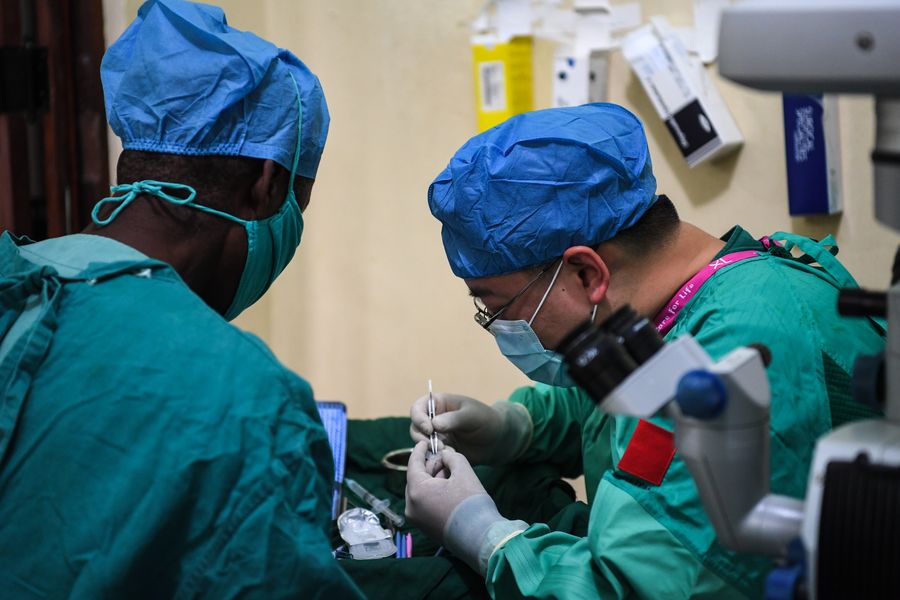
Doctors were seen working at a hospital in Zanzibar, Tanzania, Aug. 1, 2019. (Xinhua/Li Yan)
The World Health Organization (WHO) appeals to Tanzanian authorities to share information on results of recent tests of what was described as a strange disease. This came after unofficial reports of suspected Ebola cases in the east African country earlier this month.
DAR ES SALAAM, Sept. 23 (Xinhua) -- The World Health Organization (WHO) has appealed to Tanzanian authorities to share information on results of recent tests of what was described as a strange disease that killed two people in the east African nation.
"The limited available official information from Tanzanian authorities represents a challenge for assessing the risk posed by the disease," said WHO in a statement issued over the weekend.
Late last week, Tanzanian Minister for Health, Ummy Mwalimu, refuted rumors of an Ebola outbreak in the country saying people should not be scared by the rumors.
"We don't have Ebola patients in Tanzania," Mwalimu told a news conference in the commercial capital Dar es Salaam.
She convened the news conference following rumors circulating on social media that indicated that two people had died from the deadly Ebola in Tanzania that has killed more than 2,000 in neighboring Democratic Republic of the Congo (DRC).
"There were two patients who died last week from what doctors described as a strange disease but results from tests conducted by the Ministry of Health of their samples showed negative. They were not killed by the Ebola disease," said Mwalimu.
However, the WHO said in the statement that to date, the clinical details and the results of the investigation done by Tanzanian health authorities, including laboratory tests performed for differential diagnosis of these patients, have not been shared with the UN health organization headquartered in Geneva.
"The insufficient information received by WHO does not allow for a formulation of hypotheses regarding the possible cause of the illness," said the WHO statement.
At this stage, said the statement, WHO was not aware of signs of a widespread transmission of any illness related to these cases, however investigations, including with the support of WHO collaborating centers, should continue to reach a diagnosis and further inform the risk assessment.
On Sept. 10, 2019, through its regular event-based surveillance process, WHO was made aware of unofficial reports regarding the death of a person with suspected Ebola Virus disease (EVD) case in Dar es Salaam, said the statement.
The identified contacts of the deceased were unofficially reported to be quarantined in various sites in the country, said the statement adding that under the International Health Regulations(IHR) Articles 9 and 10, WHO immediately sent a verification request to the national IHR focal point of Tanzania.
On Sept. 11, through its regular event-based surveillance process, WHO was made aware of unofficial reports that a test performed at the Tanzanian National Health Laboratory was positive for EVD for this patient.
"On the same day, WHO received unofficial reports regarding another suspected EVD case in Mwanza, located in the northern region of the United Republic of Tanzania, who later tested negative for EVD," said the statement, adding that WHO continued to reach out under the IHR to the health authorities in Tanzania to verify these signals.
On Sept. 12, 2019, WHO was informed by unofficial sources of a 27-year-old patient suspected of EVD admitted in a hospital in Dar es Salaam without further information regarding laboratory tests and results, said the statement.
The statement added: "Despite several requests, WHO did not receive further details of any of these cases from Tanzanian authorities."
On July 17, 2019, WHO declared the EVD outbreak in the Democratic Republic of the Congo a public health emergency of international concern, and the overall EVD risk at the regional level was assessed to be very high.
In that context, WHO urged member states of the region, including Tanzania, to strengthen operational readiness and preparedness activities, including timely detection, verification, reporting, and laboratory confirmation of any suspicion of EVD.■



